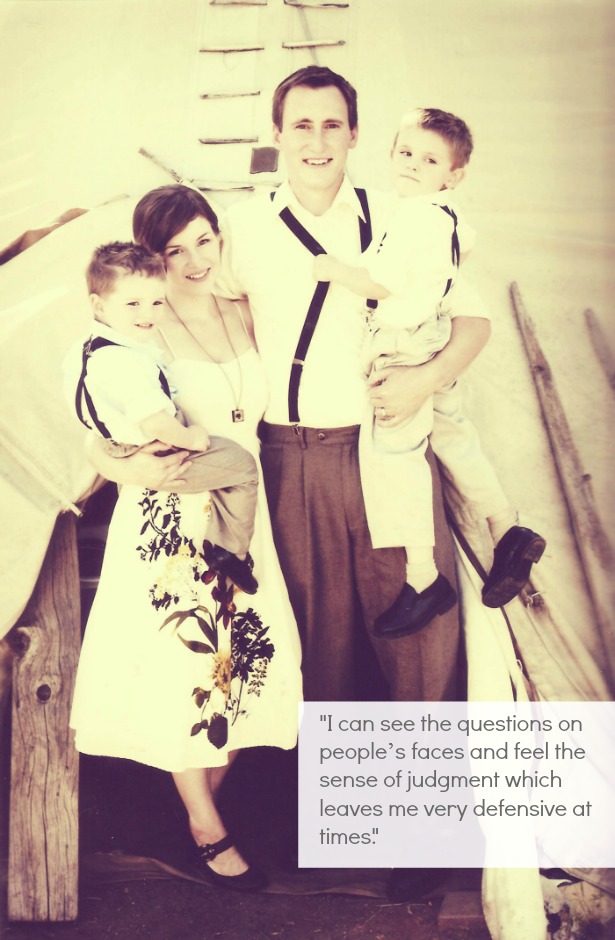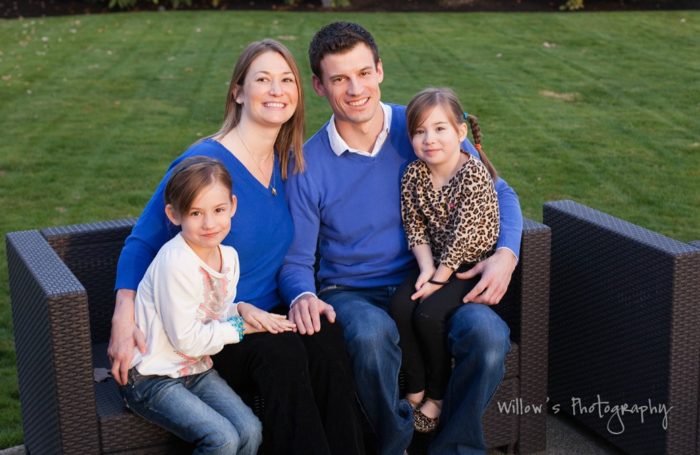This is one of many True Story interviews in which we talk to people who have experienced interesting/amazing/challenging things. This is the story of Kagen and her son Cedar.
Kagen and her family
Tell us a bit about yourself!
Hi there! I’m
Kagan, partner to Steve and mother to two highly energetic little boys with another arriving in November. I live just outside of Salt Lake City, UT in a great little historic neighborhood where I spend my days gardening, homeschooling, creating and writing. As a family we love grand adventures and great treasure hunts, among other things. This is the story of my son and what it’s like raising a child with special needs.
What is your son’s diagnosis?
In April of 2011 our son Cedar was diagnosed as having
Childhood Apraxia of Speech, a motor speech disorder that makes it difficult for him to produce sounds and words due to a lack of coordination within the area of his brain that controls speech. In addition to this he was diagnosed as having hypoglycemia this past May also known as low blood sugar.
When (and how) did you discover that your son’s needs were different than other children’s?
Cedar has always been very quiet. As a baby he hardly made a sound. By his second birthday he could say less than ten words clearly and it was then that I gave up the notion of having a late talker and accepted that there was something more to his silence. It was in our living room, just a week after moving in, that I first heard the term ‘speech apraxia’ from a speech therapist evaluating Cedar. She was so certain using words like rare and severe to describe his condition. She explained that he would never learn to talk on his own, not ever. My heart was broken.
When we later learned that Cedar had hypoglycemia it was after weeks of him complaining of headaches every morning. By this time he’d had an MRI and an EKG to rule out the possibility of seizures as a cause for his apraxia, both of which showed an ordinarily developing brain just like any other his age so initially we weren’t worried. Then one morning everything changed. Cedar wouldn’t wake up, he couldn’t remain conscious. We took him to the ER where he underwent a CT scan, an EKG and finally a simple blood test. His blood sugar level was at 40, a terrifying discovery when you consider that anything below 80 is low and below 60 can result in brain damage, seizures and death in just a matter of hours. Unfortunately we didn’t know that at the time. He was admitted and his history reviewed by geneticists and metabolic specialists before finally it was certain he had always had severe hypoglycemia.
How does your son’s diagnosis affect your daily life?
On a typical day Cedar will receive four doses of cornstarch to treat his hypoglycemia, three tablespoons three times throughout the day and five tablespoons before bed. We give this to him mixed with milk. In addition to this he is supposed to eat every two hours and isn’t allowed to have any juice or candy however it’s tough to be strict about that. To support him with his speech we meet with a speech therapist once a week and practice daily at home.
Has his diagnosis had any effect on your marriage? career? social life?
There’s nothing specific that comes to mind and yet I know it has. When so much of your time and energy goes into supporting a child with special needs you’re obviously not going to make many other decisions without giving those needs some consideration. Yet, like I said, there’s nothing specific I can think of and certainly nothing negative.
What are the biggest challenges of having a special needs child? Are there any benefits?
You would never look at Cedar and think he was anything other than a typically developing little boy yet when he speaks it’s clear he has some challenges. At three and a half he’s beginning to get stares and I know that things are becoming more apparent to the outside world. I can see the questions on people’s faces and feel the sense of judgment which leaves me very defensive at times. Right now the biggest challenge is just letting that go and focusing on what matters.
As for benefits I think they far outweigh the challenges! I’ve gained a great deal of knowledge, compassion, and clarity from my experiences with Cedar and feel more accepting than I ever have before. Most importantly, and this is my favorite thing of all, there are so many moments of absolute joy. I remember the first time Cedar was able to tell me ‘I love you’ and I actually understood it, that moment brought tears to my eyes and I’ll never forget it. Now we are able to share simple conversations and because of the effort it’s taken to get him there I no longer take those types of things for granted in any relationship.
How do you feel when you hear people use the ‘r’ word in everyday language?
When I was growing up the ‘r’ word was never allowed, in fact the ‘f’ word would have been more acceptable at our house. Because of this I had never really thought much of it except that it wasn’t nice. When I hear someone use the word now it stings but the truth is anothers use of that word says more about their ignorance as an individual than it does about my son or anyone else with special needs. Personally it isn’t something I feel passionately about because I don’t allow it to hold any significance.
What advice would you give to others who have a special needs person in their life?
When a person has special needs I think it can be hard for others to see them outside of those needs. Sure they may have a diagnosis but that doesn’t define who they are. If I had just one suggestion for others who have a special needs person in their lives I would encourage them to seek out, identify and magnify the unique gifts and abilities that person has. See them with those things in mind and you’ll both be better for it.Thanks so much for sharing, Kagen! Do you guys have any questions for her? Do any of you have friends or family with special needs?













Do you sign with Cedar? I babysit a gal who does not really speak (generalized motor delays), and signing has been a great blessing to communicate with her.
I like your attitude about the "r" word. I'm a teacher, and I shut that word down immediately in my classroom. It definitely does speak more about the person using the word — I try to explain that to my students, but they don't yet see that others will perceive and judge them for their actions even though they readily do so with others.
What an incredible interview and what a strong family!!! Best wishes with the birth of your 3rd child!
My wee sis has Down syndrome. She is 16 and I live her to bits.
I agree so much with what you said about seeing people with special needs outside of their needs. Truth is we're all people, and we have far more in common than we have differences.
*love her to bits!
I think the R-word is disgraceful. When I was a kid (39 now), nothing got you in trouble quicker at home, at school, at the park, than that word. How and why hipsters decided it's cool again is deplorable.
Here's how I combat it, controversial or not. When I'm talking with someone one-on-one (I'm not aiming for humiliation) and they use it casually, I wait until their story is over, and then quietly say, "Um, my younger brother is challenged." They are always horrified and aghast and I let them sit in it for a minute and then let them off the hook, because I don't have a younger brother.
Maybe it's a mean trick, and maybe it's offensive to someone living with challenges, but frankly, it works. I've probably done it a dozen times and literally every single time, the person has later sent me a text, an email, a call to say they never thought about it like that, and they'll never say it again. A couple of them now use my trick themselves.
So glad Kagen doesn't allow that ridiculous behavior to affect her day, but I know a whole lot of people who don't have her strength. I hate bullies and bullshit and it makes me feel good to stand up to jerks.
Thank you for posting this. I work with children with special needs, and I have a cousin with Autism, so it was really interesting to read this. xx